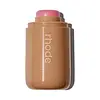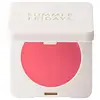What's inside
What's inside
 Key Ingredients
Key Ingredients

 Benefits
Benefits

 Concerns
Concerns

 Ingredients Side-by-side
Ingredients Side-by-side

Octyldodecanol
EmollientSynthetic Wax
AbrasiveHydrogenated Polyisobutene
EmollientCetyl Ethylhexanoate
EmollientPolyglyceryl-2 Triisostearate
EmulsifyingHydrogenated Poly(C6-14 Olefin)
EmollientBis-Diglyceryl Polyacyladipate-2
EmollientKaolin
AbrasiveSilica
AbrasiveMagnesium/Potassium/Silicon/Fluoride/Hydroxide/Oxide
Glycerin
HumectantCalophyllum Inophyllum Seed Oil
AntimicrobialPalmitoyl Tripeptide-1
Skin ConditioningPalmitoyl Tripeptide-5
Skin ConditioningCaprylyl Glycol
EmollientCaprylic/Capric Triglyceride
MaskingGlyceryl Caprylate
EmollientPentaerythrityl Tetraisostearate
EmollientAluminum Hydroxide
EmollientTriethoxycaprylylsilane
Water
Skin ConditioningPropylene Carbonate
SolventLauryl Polyglyceryl-3 Polydimethylsiloxyethyl Dimethicone
Skin ConditioningStearalkonium Hectorite
Gel FormingEthylhexylglycerin
Skin ConditioningCI 77891
Cosmetic ColorantIron Oxides
CI 45410
Cosmetic ColorantCI 42090
Cosmetic ColorantOctyldodecanol, Synthetic Wax, Hydrogenated Polyisobutene, Cetyl Ethylhexanoate, Polyglyceryl-2 Triisostearate, Hydrogenated Poly(C6-14 Olefin), Bis-Diglyceryl Polyacyladipate-2, Kaolin, Silica, Magnesium/Potassium/Silicon/Fluoride/Hydroxide/Oxide, Glycerin, Calophyllum Inophyllum Seed Oil, Palmitoyl Tripeptide-1, Palmitoyl Tripeptide-5, Caprylyl Glycol, Caprylic/Capric Triglyceride, Glyceryl Caprylate, Pentaerythrityl Tetraisostearate, Aluminum Hydroxide, Triethoxycaprylylsilane, Water, Propylene Carbonate, Lauryl Polyglyceryl-3 Polydimethylsiloxyethyl Dimethicone, Stearalkonium Hectorite, Ethylhexylglycerin, CI 77891, Iron Oxides, CI 45410, CI 42090
Caprylic/Capric Triglyceride
MaskingOctyldodecanol
EmollientTridecyl Trimellitate
EmollientPentaerythrityl Tetraisostearate
EmollientCaprylic/Capric/Myristic/Stearic Triglyceride
EmollientSilica
AbrasiveDiisostearyl Malate
EmollientPolyhydroxystearic Acid
EmulsifyingSynthetic Fluorphlogopite
C10-18 Triglycerides
EmollientStearalkonium Hectorite
Gel FormingSorbitan Olivate
EmulsifyingPolyglyceryl-2 Triisostearate
EmulsifyingSynthetic Wax
AbrasivePolyethylene
AbrasiveButyrospermum Parkii Butter
Skin ConditioningMangifera Indica Seed Butter
Skin ConditioningShorea Stenoptera Seed Butter
EmollientAcetyl Hexapeptide-8
HumectantCeramide NP
Skin ConditioningTocopherol
AntioxidantHydrolyzed Sodium Hyaluronate
Skin ConditioningLimnanthes Alba Seed Oil
Skin ConditioningPropylene Carbonate
SolventSilica Silylate
EmollientLecithin
EmollientPolyglyceryl-3 Polyricinoleate
EmulsifyingCetyl Ethylhexanoate
EmollientIsostearic Acid
CleansingGlyceryl Behenate
EmollientPolyglyceryl-3 Laurate
EmulsifyingWater
Skin ConditioningMethyl Glucose Sesquistearate
EmollientTitanium Dioxide
Cosmetic ColorantCI 77491
Cosmetic ColorantCI 77492
Cosmetic ColorantCI 77499
Cosmetic ColorantCI 42090
Cosmetic ColorantCI 15850
Cosmetic ColorantCI 15985
Cosmetic ColorantCI 45410
Cosmetic ColorantCI 19140
Cosmetic ColorantCaprylic/Capric Triglyceride, Octyldodecanol, Tridecyl Trimellitate, Pentaerythrityl Tetraisostearate, Caprylic/Capric/Myristic/Stearic Triglyceride, Silica, Diisostearyl Malate, Polyhydroxystearic Acid, Synthetic Fluorphlogopite, C10-18 Triglycerides, Stearalkonium Hectorite, Sorbitan Olivate, Polyglyceryl-2 Triisostearate, Synthetic Wax, Polyethylene, Butyrospermum Parkii Butter, Mangifera Indica Seed Butter, Shorea Stenoptera Seed Butter, Acetyl Hexapeptide-8, Ceramide NP, Tocopherol, Hydrolyzed Sodium Hyaluronate, Limnanthes Alba Seed Oil, Propylene Carbonate, Silica Silylate, Lecithin, Polyglyceryl-3 Polyricinoleate, Cetyl Ethylhexanoate, Isostearic Acid, Glyceryl Behenate, Polyglyceryl-3 Laurate, Water, Methyl Glucose Sesquistearate, Titanium Dioxide, CI 77491, CI 77492, CI 77499, CI 42090, CI 15850, CI 15985, CI 45410, CI 19140
 Reviews
Reviews

Ingredients Explained
These ingredients are found in both products.
Ingredients higher up in an ingredient list are typically present in a larger amount.
This ingredient is an emollient, solvent, and texture enhancer. It is considered a skin-softener by helping the skin prevent moisture loss.
It helps thicken a product's formula and makes it easier to spread by dissolving clumping compounds.
Caprylic Triglyceride is made by combining glycerin with coconut oil, forming a clear liquid.
While there is an assumption Caprylic Triglyceride can clog pores due to it being derived from coconut oil, there is no research supporting this.
Learn more about Caprylic/Capric TriglycerideCetyl Ethylhexanoate is an emollient ester. It comes from cetearyl alcohol and 2-ethylhexanoic acid.
Cetyl Ethylhexanoate is an emollient that adds a velvety feel to skin without being greasy or oily. Emollients help trap moisture into your skin, keeping your skin soft and hydrated.
Ci 42090 is a synthetic dye created from petroleum. It is used to give a bright blue color to cosmetics, medicine, and food.
CI 45410 is a synthetic red-pigment and dye.
It often goes by both Red 28 or Red 27; manufacturers label both ingredients as CI 45410.
This dye is commonly found in makeup because it imparts a vivid color. Some types of this dye change color based on pH level and interaction with moisture:
Your skin has a natural pH of around 4.5 - 5.5.
According to the FDA, CI 45410 is not permitted for use in eye products.
Red 27 is a flourescein dye and commonly used as a fluorescent tracer in medicine.
Learn more about CI 45410Octyldodecanol is a fatty alcohol. It is primarily used to enhance the texture of products.
As an emulsifier, Octyldodecanol helps prevent the oils and waters from separating. It also prevents ingredients from creating foam when shaken.
Octyldodecanol is created by reducing fatty acid to an alcohol.
Due to its high molecular weight, it does not get absorbed into the skin.
Learn more about OctyldodecanolPentaerythrityl Tetraisostearate is derived from isostearic acid. It is an emollient and emulsifier.
The highest concentration of this ingredient is found in lipsticks.
This ingredient is minimally water soluble and may not be Malassezia folliculitis, or fungal-acne safe.
Learn more about Pentaerythrityl TetraisostearateThis ingredient is a form of glycerin with emulsifying and emollient properties.
As an emulsifier, this ingredient helps keep products together while adding a thick texture. The manufacturer states this ingredient has emollient properties. Emollients help keep the skin hydrated by trapping moisture in.
Polyglyceryl-2 Triisostearate is created by reacting diglycerin and isostearic acid. Due to the isostearic acid base, it may not be safe for Malassezia or fungal acne.
Learn more about Polyglyceryl-2 TriisostearateThis ingredient is a solvent. It helps dissolve active ingredients and alter the texture of products.
Propylene Carbonate is commonly used in makeup and with clay, such as montmorillonite or bentonite.
Studies show this ingredient to be safe for cosmetics. When it is undiluted, it can cause skin irritation. (It is always diluted in skincare and makeup). This ingredient is water-soluble.
Propylene Carbonate is created from propylene glycol and carbonic acid.
Learn more about Propylene CarbonateSilica, also known as silicon dioxide, is a naturally occurring mineral. It is used as a fine, spherical, and porous powder in cosmetics.
Though it has exfoliant properties, the function of silica varies depending on the product.
The unique structure of silica enhances the spreadability and adds smoothness, making it a great texture enhancer.
It is also used as an active carrier, emulsifier, and mattifier due to its ability to absorb excess oil.
In some products, tiny microneedles called spicules are made from silica or hydrolyzed sponge. When you rub them in, they lightly polish away dead skin layers and enhance the penetration of active ingredients.
Learn more about SilicaStearalkonium Hectorite is a clay-derived ingredient used to thicken a product and help create a gel-like texture.
Synthetic Wax is created from fossil fuels such as natural gas. It is used to enhance texture, adjust pH, and as an occlusive.
It may also be used as an abrasive ingredient to exfoliate the skin.
Synthetic Wax may not be fungal acne safe.
Learn more about Synthetic WaxWater. It's the most common cosmetic ingredient of all. You'll usually see it at the top of ingredient lists, meaning that it makes up the largest part of the product.
So why is it so popular? Water most often acts as a solvent - this means that it helps dissolve other ingredients into the formulation.
You'll also recognize water as that liquid we all need to stay alive. If you see this, drink a glass of water. Stay hydrated!
Learn more about Water